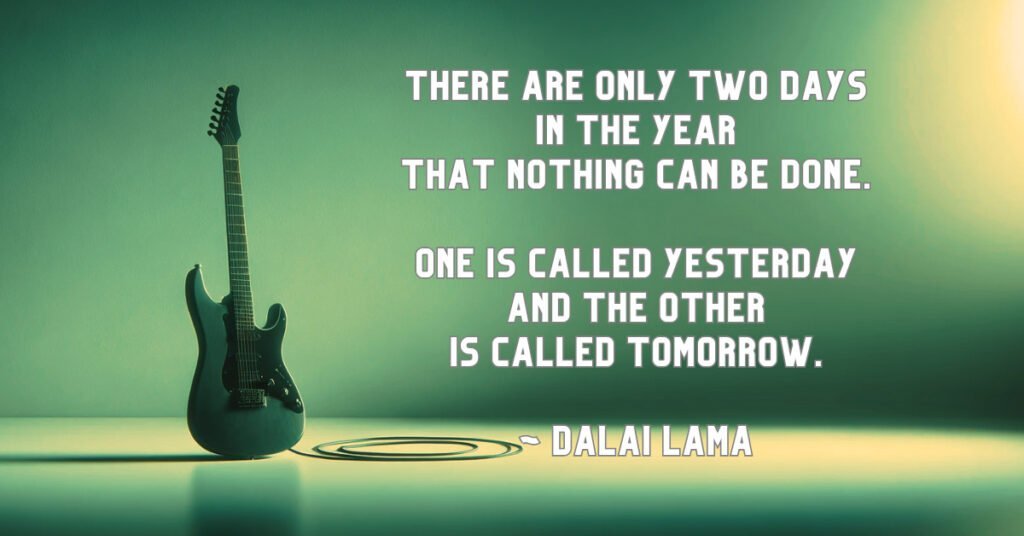Introduction: Strumming the Chords of Mental Health
In the vibrant concert of life, mental health plays a role as vital and impactful as the lead guitar – crucial to the performance yet often unacknowledged in our everyday lives. Envision our life’s journey as a rich melody, intricately weaving together both the challenging lows and the triumphant highs, with each experience adding depth to our collective harmony. Similar to the art of mastering a musical instrument, understanding and caring for our mental health is a journey of dedication and patience.
This path to mental wellness, as diverse as the spectrum of music genres, challenges the narrow viewpoint of simply ‘getting over it,’ a sentiment often held by those who haven’t faced these struggles themselves. My aim with this article is to break down these misconceptions and champion empathy and comprehensive understanding. Mental health, like a symphony, is a collective experience, requiring each of us to engage empathetically and supportively, akin to a band members attuning to one another. In recognizing and valuing the varied narratives of mental health, we cultivate a community where every individual’s story is acknowledged and esteemed.
Support for mental health should echo the vibrant applause that fuels a performer, fostering an environment where discussing mental health is as normalized and embraced as fans cheering at a concert. Adopting this inclusive approach, we transform mental health from an isolated challenge to a communal journey, placing it at the forefront of our life’s concert. In doing so, we orchestrate a symphony where each person can discover their unique rhythm within the larger narrative of life, underscoring the significance of support, openness, and a collective approach in navigating mental health challenges.
Confronting the Stigma: Beyond “Just Get Over It”
In discussions around mental health, the phrase “just get over it” is often mentioned, yet it profoundly misrepresents the realities of mental health struggles. It’s comparable to expecting someone to perform a perfect guitar solo without any prior practice, lessons, or even a basic understanding of music theory. This phrase dismisses the intricate and multifaceted nature of mental health issues. Addressing mental health, like mastering a musical instrument, requires time, dedication, and often professional guidance. It’s not a simple task that can be accomplished overnight or brushed aside. This oversimplified mindset undermines the genuine efforts and challenges faced by those dealing with mental health issues. It ignores the depth and complexity of mental health, trivializing the genuine struggles and efforts required to manage and overcome these challenges. Understanding mental health requires acknowledging that it’s a complex blend of emotions, experiences, and biological factors, all interwoven into the fabric of a person’s being. It’s about recognizing that mental health is as important and intricate as physical health, deserving of the same attention, care, and understanding.
Additional Misguided Stigmas Include:
Blame and Self-Doubt
- Perceived Weakness: Believing that needing help is a sign of weakness can deter individuals from seeking necessary support. This misconception exacerbates conditions and can lead to a spiraling effect in mental health, much like a small crack in a guitar that worsens over time.
- Self-Blame: Individuals internalizing their mental health struggles as personal failures may experience increased stress and anxiety. This worsens their mental state and creates a barrier to seeking help, akin to a musician blaming themselves for not mastering a complex piece instantly.
Misunderstanding and Stereotyping
- Misinterpretation: Misunderstandings about mental health, especially regarding serious conditions like schizophrenia or bipolar disorder, often lead to fear, prejudice, and isolation. This deprives affected individuals of community and support, much like a misunderstood lyric can change the meaning of a song.
- Feeling Inadequate: Those feeling broken due to their mental health challenges may struggle with low self-esteem. This hinders their social interactions and ability to advocate for themselves, similar to a musician feeling inadequate to perform.
Denial and Doubt
- Dismissal as Overreaction: Dismissing mental health issues as overreactions prevents individuals from acknowledging their struggles and seeking help. This can lead to worsening conditions, like ignoring the signs of a damaged instrument.
- Invisibility: The often-invisible nature of mental health struggles leads to skepticism about their legitimacy, making it difficult for individuals to express their challenges and receive support.
Shame and Concealment
- Overwhelming Shame: Feelings of shame lead individuals to conceal their mental health struggles, contributing to a cycle of isolation and worsening mental health. This is akin to a performer hiding their true emotions behind a facade.
- Disbelief in Severity: Doubting the severity of mental health issues diminishes the experiences of those affected, leading to a lack of empathy and support.
Avoidance and Judgment
- Blurred Lines: The stigma can blur the lines between reality and misconception, leading to confusion about mental health conditions, much like a misunderstood song.
- Avoiding Interaction: Avoiding those with mental health challenges perpetuates isolation, depriving them of essential community and connections for recovery.
The Risks of Stigma
Barriers to Seeking Help
- Delayed Treatment: Stigma often leads individuals to delay seeking help, resulting in worsening symptoms and a more challenging recovery process.
- Lack of Support: The reluctance to seek help due to stigma deprives individuals of crucial emotional support, exacerbating feelings of loneliness and helplessness.
Negative Impact on Self
- Self-Stigmatization: Internalizing societal stigma can lead to damaging self-perception, contributing to a cycle of self-doubt and shame.
- Reduced Self-Esteem: Lowered self-esteem caused by stigma can impact personal and professional relationships, hindering individuals’ ability to thrive.
Social Isolation and Masking
- Withdrawal: Stigmatized individuals often isolate themselves, intensifying feelings of loneliness and exacerbating mental health challenges.
- Concealing True Emotions: Hiding true feelings due to stigma creates barriers to authentic connections and receiving appropriate support.
Health Implications
- Physical Health Impact: Stigma can also negatively affect physical health, as stress and anxiety take a toll on the body.
- Suicidal Thoughts: The weight of stigma can lead to hopelessness and increased risk of suicidal thoughts, highlighting the need for empathetic support and intervention.
Societal Consequences
- Resource Underutilization: Stigma leads to underutilization of mental health resources, preventing people from accessing necessary care.
- Widespread Misunderstanding: Societal misunderstandings perpetuate discrimination, creating an environment where those with mental health conditions face unequal treatment.
Overcoming Misconceptions: A Compassionate Approach
Education and Advocacy
- Informed Understanding: Educating oneself and others about mental health challenges is crucial for dispelling myths and fostering empathy.
- Policy Advocacy: Advocating for better mental health policies is essential for increasing access to care and reducing stigma.
Communication and Support
- Open Discussions: Encouraging honest conversations about mental health helps normalize these issues and promote a culture of support.
- Empathy and Understanding: Offering empathetic support to those sharing their mental health experiences fosters a sense of community and belonging.
Community Involvement
- Active Participation: Engaging in mental health awareness initiatives significantly influences public perceptions and attitudes.
- Promoting Inclusivity: Creating inclusive environments where diverse experiences are valued enriches the mental health conversation.
Encouragement and Self-Care
- Self-Care Promotion: Encouraging self-care practices helps individuals manage their mental health more effectively.
- Leading by Example: Sharing personal mental health experiences can inspire others to prioritize their well-being and seek help when needed.
Respect and Challenge
- Respecting Boundaries: It’s important to respect individuals’ readiness to discuss their mental health, fostering trust and understanding.
- Confronting Stigma: Actively challenging stigma when encountered helps create a more supportive and empathetic society.
The Importance of Seeking Help
Encouraging an environment where seeking help is normalized is crucial for mental health well-being. Asking for help is a brave and necessary step in managing mental health challenges, akin to a musician seeking guidance to enhance their performance. It leads to early intervention, which can significantly reduce suffering and improve overall well-being. Promoting help-seeking behavior also plays a vital role in reducing stigma and setting a positive example for others.
Early Intervention and Reduced Suffering
- Prompt Action: Early help-seeking can prevent minor mental health issues from escalating into more severe conditions.
- Alleviated Distress: A supportive environment for seeking help can significantly reduce emotional suffering and feelings of isolation.
Enhanced Well-Being and Empowerment
- Improved Mental Health: Timely and appropriate care can lead to better mental health outcomes, enhancing overall well-being.
- Building Resilience: Seeking help fosters resilience, empowering individuals to better handle future challenges.
Stigma Reduction and Positive Role Modeling
- Changing Perceptions: Normalizing help-seeking behavior is key in reducing mental health stigma and fostering a more understanding society.
- Inspiring Others: Individuals who seek help can inspire others to prioritize their mental health and seek assistance when needed.
Faster Recovery and Problem-Solving
- Quicker Healing: Early intervention often leads to a faster recovery process, allowing individuals to return to their daily routines sooner.
- Skill Development: Seeking help can enhance problem-solving skills, aiding individuals in navigating life’s challenges more effectively.
Strengthened Relationships and Relapse Prevention
- Improved Relationships: Addressing mental health concerns can positively impact relationships with family, friends, and colleagues.
- Minimizing Relapse: Early help can reduce the likelihood of future mental health crises, contributing to long-term well-being.
Conclusion: Embracing the Mental Health Melody
As we conclude our exploration into mental health stigma, we embrace a new chapter filled with hope and understanding. We’ve discovered the transformative power of empathy, education, and the courage to seek support. Remember, reaching out for help is a key step toward a harmonious life, enriching both our individual experiences and the collective melody of our community.
In this era of heightened awareness, we move towards a future where mental health is treated with the compassion and understanding it deserves, much like a beloved rock anthem that unites and uplifts. Let’s continue to champion mental health awareness, making it a central part of our lives, as we rock on with the enduring power and passion of great music.
Together, we can amplify the conversation about mental health, breaking down the walls of stigma and misunderstanding. It’s time to shift the narrative, to recognize that mental health, like a complex and beautiful song, is an integral part of the human experience. It’s a journey that requires not just individual courage but also collective support and understanding.
Our shared goal should be to create a world where mental health is spoken about with the same openness and acceptance as physical health. A world where seeking help is seen as a sign of strength, not weakness. Where every individual is encouraged to find their unique rhythm in managing their mental health, supported by a community that listens and understands.
So let’s turn up the volume on mental health awareness. Let’s be the chorus of support for those who struggle, and the bandmates who help each other find the harmony in life’s complex melody. Together, we can make the journey of mental health not a solitary path, but a shared journey filled with hope, understanding, and the beautiful music of a life well-lived.
As the curtains close on our rock concert analogy, remember, mental health is not a solo act; it’s a band effort. And in this band, everyone deserves to be heard, supported, and celebrated. Keep rocking mental health awareness, and together, we’ll break the stigma and embrace the mental health melody in all its complexity and beauty.


